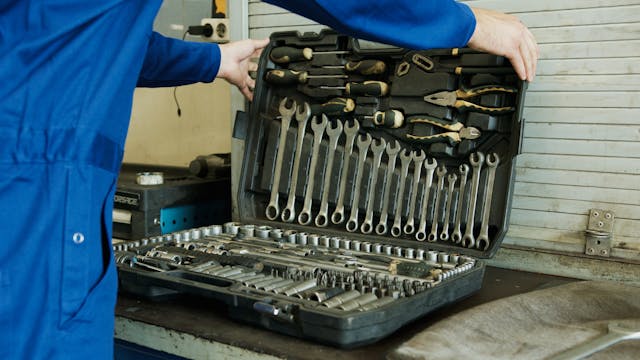It’s important to keep your company tools somewhere secure and safe. But exactly where should you store them? It depends a lot on how many tools you have, what type of tools they are and the nature of your business. Below are a few different tool storage options to consider for your business.
In a tool cupboard?
A tool cupboard within your workplace or in your home could be a great place to store your work tools. You can keep your tools organized and lock them away to prevent them getting stolen.
The most common material for a tool cupboard is metal – it’s harder to break into than a plastic or wooden cupboard and can withstand fires or floods. You can build your own tool cupboard or buy a pre-built cupboard.
You can lock your cupboard using a simple key and padlock, or you can explore more elaborate locking mechanisms such as combination locks and keypads. A smart lock could even be a solution worth considering.
In a tool shed?
If you don’t have an indoor space to store tools, you could consider building a tool shed. This could be in the grounds of a business premises or in your backyard.
Tool sheds can be better for storing larger outdoor tools. However, you need to be careful of storing electronic tools in a shed that is not climate controlled – moisture, heat or frost could damage these tools. One idea could be converting 20ft shipping containers to help you create the perfect temperature-controlled storage unit for electronic tools or machinery.
Metal tool sheds will keep out pests and also be harder to break into. A tool shed is more likely to be targeted by burglars than a tool cupboard, so make sure to invest in a robust lock.
In a portable storage pod?
Pod storage can be a good option when working on a temporary site. These are steel containers that come in various sizes that can be dropped off at a location to securely store your tools in so that you don’t have to take your tools home/back to your office with you each day.
You will need somewhere to keep this pod when not in use and you’ll need a suitable vehicle to transport it to each site, unless you plan to hire out pods for individual jobs. In some cases, pod storage may require a permit. This is something you’ll have to look into before moving a pod to a new site.
In your business vehicle?
A lot of tradespeople store their tools in a van. If you only need a few tools, you may even be able to store them in a toolbox in the trunk of your car.
Storing tools in a vehicle allows you to constantly have access to your tools from whatever location you decide to work from. However, there are risks to storing tools in a vehicle. You could lose all your tools if someone steals your vehicle or manages to break into it. And your vehicle insurance rates are likely to be higher if you store your tools in it. On top of this, you need to make sure tools are stored securely in place while driving so that they don’t get damaged – a tool box, organizers, straps or in-build compartments may be necessary to prevent tools rolling around.
You can secure your vehicle by installing a high quality lock and always setting the alarm. Parking in a secure location can make an impact too – consider parking in a garage or in an area that’s well-lit/monitored by security cameras.
In a self storage unit?
Self-storage units are units that you can rent to store your business equipment in. They are a useful solution if you don’t have business premises and don’t have enough space to store tools at home or in a vehicle.
When choosing a self-storage unit, it’s important to choose a unit that is located near to where you live. This will ensure that you’re not going out of your way to pick up tools whenever you need them.
Storage units are generally best suited for large equipment that you don’t need to access too often. If you run a seasonal business, then self-storage could be ideal for storing equipment out of season.
There are many different types of self-storage units that you can consider. Climate-controlled storage units are ideal for electronic tools. Drive-in outdoor units meanwhile allow you to load tools easily into a vehicle. Make sure to consider the security of a unit – some unit facilities will have strict access controls in place and security cameras, while others can be accessed by anyone and are not monitored.
